浪漫主义时期文学thelambthetygerwilliamblake课件
合集下载
浪漫主义时期文学 the lamb the tyger william blake教学内容

Religion is the instrument
▪ A little black thing among the snow:
of their repression/ oppression its nature is to help bring misery
Crying weep, weep, in notes of woe!
▪ And because I am happy & dance & sing,
of his own and other’s work.
▪ 2. Major Works
➢ Songs of Innocence (1789) ➢ Songs of Experience (1794) ➢ Marriage of Heaven and Hell (1790) ➢ a few prophetic books,
:田野一片荒芜,道路长满荆棘;孩子们论落街头,挨家挨户扫
烟囱;士兵们在流血叹息,妓女们在夜半的街头诅咒;街道和河 流“专利”化,“残酷、妒忌、恐怖和隐秘”代替了“爱、仁慈、怜悯 与和平。”
▪ The Chimney Sweeper is the title of two poems by William Blake, published in Songs of Innocence in 1789 and Songs of Experience in 1794.In the earlier poem, a young chimney sweeper recounts a dream had by one of his fellows, in which an angel rescues the boys from coffins and takes them to a sunny meadow; in the later poem, an apparently adult speaker encounters a child chimney sweeper abandoned in the snow while his parents are at church.
williamBlake威廉布莱克专业知识课件
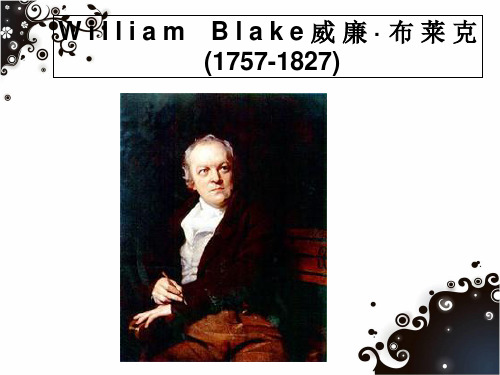
Life Experience
1783, his first collection of p o e m s Poetical Sketches w a s printed
1782, he married the illiterate
Catherine and taught her to read, write and engrave
A prose work is important for its expression of Blake's spirit of revolt against oppression. He maintains liberty against the law of bourgeois society. 布莱克对当初全部旳政 府、道德以及宗教法规 进行抨击批判。
• 托姆就醒了;屋子里黑咕隆咚, • 我们就起来拿袋子、扫帚去做工。 • 大清早尽管冷,托姆旳心里可温暖; • 这叫做:各尽本分,就不怕劫难。
The Chimney Sweeper (II)
A little black thing among the snow Crying ‘weep, weep” in notes of woe! “Where are thy father & mother? say?” “They are both gone up to the church to pray.”
• To see a World in a Grain of Sand And a Heaven in a Wild Flower,
• Hold Infinity in the palm of your hand • And Eternity in an hour.
【精品】英国文学之威廉姆布莱克——老虎William Blake and The Tyger精品课件
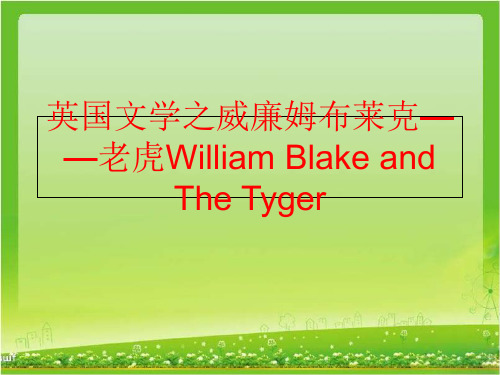
His literary achievements
(2)Songs of Innocence(1789) It is a lovely volume of poems, presenting a happy and innocent world, though not without its evils and sufferings. In this volume, Blake, with his eager quest for new poetic forms and techniques, broke completely with the traditions of the 18th century. He experimented in meter and rhyme and introduced bold metrical innovations which could not be found in the poetry of his contemporaries.
Fierceness and gentleness are contrasting qualities of the human mind.
An imaginative poet
“I know that This World is a World of IMAGINATION﹠Vision.” and that “The Nature of my work is visionary or imaginative.”
﹡ the French Revolution — a necessary stage
leading to the millennium predicted by the biblical prophets.
英国文学浪漫主义时期 ppt课件

Historical Background
Politically: the French Revolution
"Declaration of Rights of Man" (1791-2), Thomas Paine
"Inquiry concerning Political Justice" (1793), William Godwin
a tendency to turn or escape from the tumultuous嘈杂的动乱的and confusing society
Characteristics of Romanticism
•Love of Nature: The Romantics greatly emphasized on the importance of nature, and one of the main characteristics of Romanticism in poetry is the beauty of nature found in the country life. This was mainly because the industrial revolution had taken man from the peaceful country life towards the city life, transforming man's natural order. Nature was not only appreciated for its physical beauty by the Romantics, but also for its ability to help the urban man find his true identity.
The Lamb课件
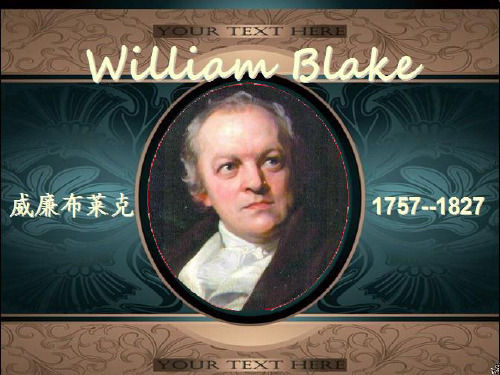
•In the first stanza, the speaker wonders who the lamb's creator is; the answer lies at the end of the poem. Here we find a physical description of the lamb, seen as a pure and gentle creature. •In the second stanza, the lamb is compared with the infant Jesus, as well as between the lamb and the speaker's soul. •In the last two lines the speaker identifies the creator: God.
Analysis
• This poem has complimented the goodness of the creator and finds a source of gentleness, selflessness, and love from the creator . • The use of repetition and parallelism allows for a very predictable and simple presentation ,which is nothing less than intentionally child-like.
• Little Lamb, who made thee? • Dost thou know who made thee? • Little Lamb, I'll tell thee, • Little Lamb, I'll tell thee, • He is called by thy name, • For he calls himself a Lamb. • He is meek, & he is mild; • He became a little child. • I a child, & thou a lamb, • We are called by his name. • Little Lamb, God bless thee! • Little Lamb, God bless thee!
The-TygerPPT课件

❖ What he anvil? What drea扣d紧gr,as紧p握
❖ 是怎样的槌?怎样的链子? ❖ 在怎样的熔炉中炼成你的脑筋? ❖ 是怎样的铁砧?怎样的铁臂
❖ Dare its deadly terrors clasp?
❖ 敢于捉着这可怖的凶神?
❖ When the stars threw down their spears, ❖ And water’d heaven with their tears, ❖ Did he smile his work to see? ❖ Did he who made the Lamb make thee?
❖ 你炯炯的两眼中的火 ❖ 燃烧在多远的天空或深渊? ❖ 他乘着怎样的翅膀搏击? ❖ 用怎样的手夺来火焰?
肌肉
❖ And what shoulder, and what art,
❖ 又是怎样的臂力,怎样的技巧,
❖ Could twist the sinews of thy heart?
❖ 把你的心脏的筋肉捏成?
-
6
The Tyger / 老虎
(郭沫若译)
❖ Tyger! Tyger! Burning bright
❖ 老虎!老虎!黑夜的森林中
❖
In the ffroamrees: tcsreoatfet;he night,
创造,造就
对称
❖ What immortal hand or eye
❖ 燃烧着的煌煌的火光, ❖ 是怎样的神手或天眼
Songs of Innocence
Songs of Experience
-
5
A lovely volume of poems, presenting a happy and innocent
英美文学课件3 The Romantic Period

“And because I am happy & dance & sing They think they have done me no injury, And are gone to praise God & his Priest & King, Who make up a heaven of our misery.”
• Wordsworth and Coleridge were the major representatives of this movement. They explored new theories and innovated mew techniques in poetry writing. Wordsworth’s theory is calling for simple themes drawn from humble life expressed in the language of ordinary people.
The Chimney Sweeper (from Songs of Experience) A little black thing among the snow Crying “’weep! ‘weep!” in notes of woe! “Where are thy father & mother? Say?” “They are both gone up to the church to pray.
• Wordsworth is regarded as a “worshipper of nature.” • “The Sparrow’s Nest” “To a Skylark” • “To the Cuckoo” “To a Butterfly” • “I Wandered lonely as a Cloud” • “An Evening Walk” • “My Heart Leaps up” • “Tintern Abbey”
浪漫主义时期文学thelambthetygerwilliamblake课件
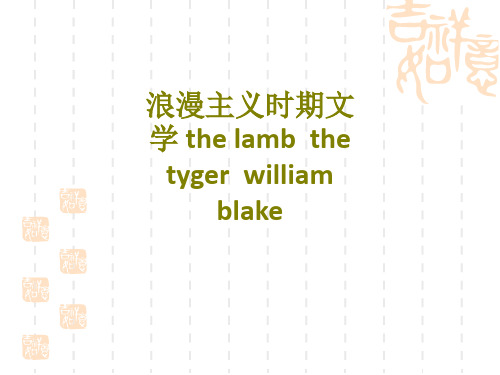
(2)“ he is called by the name, For he calls himself a lamb”, what’s the meaning of this sentence?
Jesus and lamb. Jesus was crucified during the Feast of the Passover (celebrating the Jews' escape from Egypt) when lambs were slaughtered in the temple at Jerusalem. This was believed to take away the sins of the people who took part in the feast. So when Jesus was killed, for the sins of all people, according to the Christian faith, He came to be called The Lamb of God.
老虎!老虎!黑夜的森林中/ 燃烧着的煌煌的火光,/ 是怎样的袖手或天眼/ 造出了你这样的威武堂堂?
(2-4):The dangerous process of creation
你炯炯的两眼中的火/ 燃烧在多远的天空或深渊?/ 他乘着怎样的翅膀搏击?/ 用怎样的手夺来火焰?
:田野一片荒芜,道路长满荆棘;孩子们论落街头,挨家挨户扫
烟囱;士兵们在流血叹息,妓女们在夜半的街头诅咒;街道和河 流“专利”化,“残酷、妒忌、恐怖和隐秘”代替了“爱、仁慈、怜悯 与和平。”
The Chimney Sweeper is the title of two poems by William Blake, published in Songs of Innocence in 1789 and Songs of Experience in 1794.In the earlier poem, a young chimney sweeper recounts a dream had by one of his fellows, in which an angel rescues the boys from coffins and takes them to a sunny meadow; in the later poem, an apparently adult speaker encounters a child chimney sweeper abandoned in the snow while his parents are at church.
William-BlakePPT课件
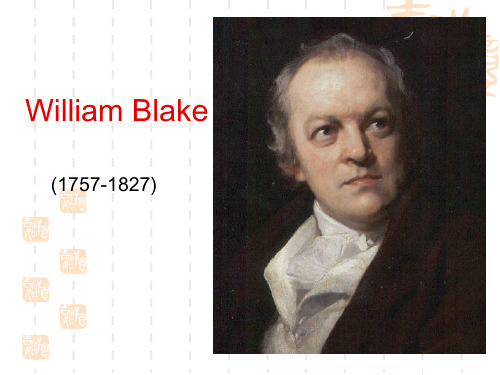
He'd have God for his father, and never want joy. And so Tom awoke, and we rose in the dark,
诉汤姆, 如果他是一个乖小孩 上帝会是他的父亲 并且将永不欠缺喜乐。
And got with our bags and our brushes to work. 汤姆醒了过来,我们也都在黑暗中起床
And so he was quiet, and that very night,
嘿汤姆,不要理会你的头发, 当没了你的头发 你会知道煤 灰不再可能弄脏你金黄的头 发。
.
他安静了下来,而且就在那11
一夜
当汤姆沉睡时,他看到这样的一幅图
像千百个扫烟囱的小孩,狄克、乔伊、
As Tom was a-sleeping, he had such a sight! - 涅德与杰克
突地来了一位天使带着一把明亮的钥匙打开了棺木盒让所有的小孩起身出在青翠的草原上这些小孩尽情笑着跑着他们沐浴在溪流中并且在阳光下躺裸着身子洁白干净他们的工具袋抛在一旁他们在云间跳跃在风中嬉闹天使告诉汤姆如果他是一个乖小孩上帝会是他的父亲并且将永不欠缺喜乐
William Blake
(1757-1827)
The theme
.
13
the soul word
▪ angel There are so many poor children.No one loves them,so they can only hope that the angels.The children like Tom,they all have miserable lives .But they still have sweet dream and nice wish.
经典:浪漫主义诗人William-Blake

And yet forgives the Butcher's Knife
❖
❖
The Bat that flits at close of Eve
Has left the Brain that won't believe.
The Owl that calls upon the Night
Speaks the Unbeliever's fright.
❖ Symbolism in wide range is a distinctive feature of his poetry.
❖ The subject matter of his works were Romantic in their nature because they included discussion of nature religion,the individual ,and ideas from his own imagination.
This is caught by Females bright
❖
And return'd to its own delight.
❖
The Bleat, the Bark, Bellow & Roar
❖
Are Waves that Beat on Heaven's Shore.
❖
The Babe that weeps the Rod beneath
❖
❖
Raises from Hell a Human Soul.
❖
❖
The wild deer, wand'ring here & there, ❖
英国伟大诗人威廉布莱克-William-Blake市公开课一等奖省赛课微课金奖PPT课件

10/19
Questions for Discussion
1.Make a Comparison between Songs of Innocence and Songs of Experience.
• Language/ tone/ theme 2. Make a tentative
Interpretation of the following poem:
But most thro’ midnight streets I hear How the youthful Harlot’s curse Blasts the new born Infant’s tear, And blights with plagues the Marriage hearse.
The Romantic Period
• Neoclassicism: reason, order, accuracy and elegant wit
• Romanticism: passion, emotion, and natural beauty
The romantic period is an age of poetry.
“Piper, sit thee down and write In a book, that all may read.” So he vanish’d from my sight, And I pluck’d a hollow reed,
13/19
And I made a rural pen, And I stain’d the water clear, And I wrote my happy songs Every child may joy to hear.
Questions for Discussion
1.Make a Comparison between Songs of Innocence and Songs of Experience.
• Language/ tone/ theme 2. Make a tentative
Interpretation of the following poem:
But most thro’ midnight streets I hear How the youthful Harlot’s curse Blasts the new born Infant’s tear, And blights with plagues the Marriage hearse.
The Romantic Period
• Neoclassicism: reason, order, accuracy and elegant wit
• Romanticism: passion, emotion, and natural beauty
The romantic period is an age of poetry.
“Piper, sit thee down and write In a book, that all may read.” So he vanish’d from my sight, And I pluck’d a hollow reed,
13/19
And I made a rural pen, And I stain’d the water clear, And I wrote my happy songs Every child may joy to hear.
William-BlakePPT课件

▪ child child likes lamb,cute, pure and nice
.
9
The Chimney-Sweeper
.
10
The Chimney-Sweeper
母亲去逝的时候,我仍然非
When my mother died I was very young,
常非常的幼小
And my father sold me while yet my tongue Could scarcely cry 'Weep! weep! weep! weep!'
我是个小孩你是羔羊
咱俩的名字跟他一样。
小羔羊上帝保佑你。
8
小羔羊上帝保佑你
the soul word
▪ made creating.God gave lamb life ,voice,clothing and rejoice
▪ lamb everyone was a lamb,we all was pure and happy,but because of the life,we have changed.But,i believe,this still a lamb deep in our heart.
Little lamb, I'll tell thee; Little lamb, I'll tell thee: He is called by thy name, For He calls Himself a Lamb. He is meek, and He is mild, He became a little child. I a child, and thou a lamb, We are called by His name. Little lamb, God bless the. e! Little lamb, God bless thee!
.
9
The Chimney-Sweeper
.
10
The Chimney-Sweeper
母亲去逝的时候,我仍然非
When my mother died I was very young,
常非常的幼小
And my father sold me while yet my tongue Could scarcely cry 'Weep! weep! weep! weep!'
我是个小孩你是羔羊
咱俩的名字跟他一样。
小羔羊上帝保佑你。
8
小羔羊上帝保佑你
the soul word
▪ made creating.God gave lamb life ,voice,clothing and rejoice
▪ lamb everyone was a lamb,we all was pure and happy,but because of the life,we have changed.But,i believe,this still a lamb deep in our heart.
Little lamb, I'll tell thee; Little lamb, I'll tell thee: He is called by thy name, For He calls Himself a Lamb. He is meek, and He is mild, He became a little child. I a child, and thou a lamb, We are called by His name. Little lamb, God bless the. e! Little lamb, God bless thee!
浪漫主义 欧洲文学史课件

TIGER
• TIGER, tiger, burning bright In the forests of the night, What immortal hand or eye Could frame thy fearful symmetry? In what distant deeps or skies Burnt the fire of thine eyes? On what wings dare he aspire? What the hand dare seize the fire? And what shoulder and what art Could twist the sinews of thy heart? And when thy heart began to beat, What dread hand and what dread feet?
• As a reaction to the industrial revolution, it looked to the direct contact with nature for inspiration. • Romanticism emphasized individual values and aspirations above those of society.
• 什么样铁链?什么样铁锤? 什么样铁链?什么样铁锤? 什么样熔炉里炼你的脑髓? 什么样熔炉里炼你的脑髓? 什么样铁砧? 什么样铁砧?什么样猛劲 一下子掐住了骇人的雷霆? 一下子掐住了骇人的雷霆? 到临了,星星扔下了金枪, 到临了,星星扔下了金枪, 千万滴眼泪洒遍了穹苍, 千万滴眼泪洒遍了穹苍, 完工了再看看.他可会笑笑? 完工了再看看.他可会笑笑? 不就是造羊的把你也造了? 不就是造羊的把你也造了? 老虎!老虎!火一样辉煌, 老虎!老虎!火一样辉煌, 烧穿了黑夜的森林和草莽, 烧穿了黑夜的森林和草莽, 什么样非凡的手和眼睛 敢塑造你一身惊人的匀称
The Romantic Period浪漫主义时期优秀课件

2021/3/29
14
2021/3/29
15
❖ Lyric(抒情诗)(from Greek lyra---“song”)
❖ As its Greek name indicates, a lyric was originally a short poem written in a repeating stanzaic form, often designed to be set to music. Now, it usually refers to the poem that expresses a speaker’ personal thoughts, perceptions or feelings. The elegy, ode and sonnet are all forms of the lyric.
❖ 其他作品有:《抒情歌谣集》,诗集《双卷诗》 (Poems in Two Volumes),关于自然的短诗《致 杜鹃》( To the Cuckoo)《我如行云独自游》(I Wandered Lonely as a Cloud)关于人类生活的 短诗《露西》(Lucy Poems)《孤独的收割者》 (The Solitary Reaper)《致高地的姑娘》(To a Highland Girl)
1772-1834)
2021/3/29
17
❖ 湖畔派Lake Poets
❖ 18~19世纪的英国浪漫主义诗歌流派。主要成员 有华兹华斯、柯尔律治和骚塞。由于他们三人曾一
同隐居于英国西北部的昆布兰湖区,先后在格拉斯
米尔和文德美尔两个湖畔居住,以诗赞美湖光山色,
所以有“湖畔派诗人”之称。
在诗歌题材上,他们主张写下层人民的日常生活,
大学英语课件williamblake
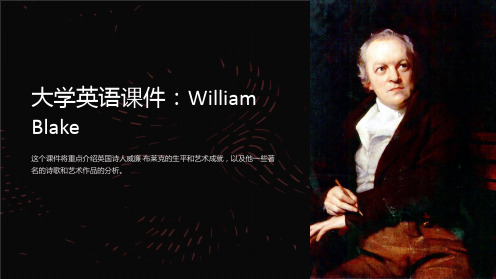
文化背景
布莱克的《创世之曲》受到基督教圣经中创世 记的启示,以及对宗教、哲学和神秘主义思想 的思考。
威廉·布莱克的艺术和文学对世界产生 的影响
1 文学影响
布莱克的诗歌作品对浪漫主义运动和后继的文学发展产生了深远的影响。他的诗歌充满 了情感、想象力和自由的精神。
2 艺术影响
布莱克的视觉艺术作品影响了后续艺术家和艺术运动,例如象征主义和超现实主义。他 的作品展示了独特的审美观和对人类精神和信仰的探索。
文化背景
布莱克的《虎》受到了浪漫主义和宗教启示的 影响,以及对自然界力量和神性的思考。
《无辜的童年》
诗歌分析
《无辜的童年》是布莱克另一首具有深刻意义 的诗歌,通过对童年经历的思考,探索了无辜 和成长的主题。
文化背景
布莱克的《无辜的童年》反映了当时社会对儿 童处境的关注,以及对人与社会关系的思考。
《彩云梯》
威廉·布莱克的创作与传统文化的关系
1
受传统文化影响
布莱克深受英国传统文化、宗教和神话的影响,他的创作借鉴了古代文学、宗教 经典和民间传说的元素。
2
创造自己的艺术语言
布莱克不断探索和创新,发展出独特的艺术语言,将视觉和文字结合在一起,形 成了自己独特的艺术风格。
3
批判传统观念
布莱克的作品也对当时的传统观念进行了批判,他对社会不公和宗教束缚的反思 与传统文化形成了对立和对话。
大学英语课件:William Blake
这个课件将重点介绍英国诗人威廉·布莱克的生平和艺术成就,以及他一些著 名的诗歌和艺术作品的分析。
威廉·布莱克的生平
威廉·布莱克(William Blake)是18世纪英国的一位重要诗人和艺术家。他出生于伦敦,一生饱受 贫困和不公正待遇。 然而,尽管生活困苦,布莱克对于艺术的热爱和创造力从未停止。 他作为一位天才的视觉艺术家,以及创作了众多优秀的诗歌作品而闻名于世。
William_Blake简介及作品PPT精选文档
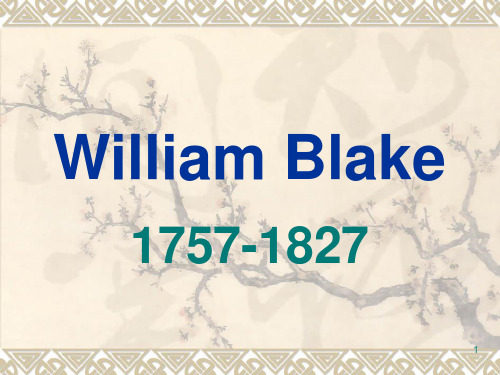
7
The Marriage of Heaven and Hell
❖It is regarded as Blake’s principle prose work, was conceived as early as 1790 but was not etched in its entirely until 1793. while this work was given lavish praise by the 19th-century poet Swinburne, it is actually very obscure.
16
Comments on Blake
❖ Blake should be remembered chiefly for his “Songs of experience” in which he poured out his bitter social criticism on the reality of his day, but also for the topical references to the fight for the freedom and the expose of tyranny in “ The French Revolution” and “America” and “The Songs of Los”, and for the great lyricism with which these poems and these great pages are written.
❖ He cherished great expectations and enthusiasm for the French Revolution, and regarded it as a necessary stage leading to the millennium predicted by the biblical prophets
The Marriage of Heaven and Hell
❖It is regarded as Blake’s principle prose work, was conceived as early as 1790 but was not etched in its entirely until 1793. while this work was given lavish praise by the 19th-century poet Swinburne, it is actually very obscure.
16
Comments on Blake
❖ Blake should be remembered chiefly for his “Songs of experience” in which he poured out his bitter social criticism on the reality of his day, but also for the topical references to the fight for the freedom and the expose of tyranny in “ The French Revolution” and “America” and “The Songs of Los”, and for the great lyricism with which these poems and these great pages are written.
❖ He cherished great expectations and enthusiasm for the French Revolution, and regarded it as a necessary stage leading to the millennium predicted by the biblical prophets
英国诗歌欣赏威廉布莱克《小羔羊》the lamb(课堂PPT)

He became a little child. 他又变成了一个小小孩。
By——William Blake 10
I a child, and thou a lamb, 我是个小孩,你是羔羊,
We are called by his name. 咱俩的名字跟他一样
Little Lamb, God bless thee! 小羔羊,上帝保佑你!
3
Poetic structure
• This poem has a simple rhyme scheme : AA BB CC DD AA AA EF GG FE AA
• The speaker wonders who the lamb's creator is; the lamb is compared with the infant Jesus, as well as between the lamb and the speaker's soul. In the last two lines the speaker identifies the creator: God.
4
The Lamb
5
The Lamb
Little Lamb, who made thee? 小羊羔谁创造了你?
Dost thou know who made thee? 你可知道谁造了你?
Gave thee life and bid thee feed 给你生命,哺育着你,
By the stream and o'er the mead: 在溪流旁,在青草地;
By——William Blake
7
Little Lamb, who made thee? 小羔羊,谁创造了你?
By——William Blake 10
I a child, and thou a lamb, 我是个小孩,你是羔羊,
We are called by his name. 咱俩的名字跟他一样
Little Lamb, God bless thee! 小羔羊,上帝保佑你!
3
Poetic structure
• This poem has a simple rhyme scheme : AA BB CC DD AA AA EF GG FE AA
• The speaker wonders who the lamb's creator is; the lamb is compared with the infant Jesus, as well as between the lamb and the speaker's soul. In the last two lines the speaker identifies the creator: God.
4
The Lamb
5
The Lamb
Little Lamb, who made thee? 小羊羔谁创造了你?
Dost thou know who made thee? 你可知道谁造了你?
Gave thee life and bid thee feed 给你生命,哺育着你,
By the stream and o'er the mead: 在溪流旁,在青草地;
By——William Blake
7
Little Lamb, who made thee? 小羔羊,谁创造了你?
大学英语课件blake

总结
艺术成就
总体评价William Blake的艺术成就,包括他对诗歌和绘画领域的深远影响。
后世影响
探讨Blake的诗歌和画作对后世文化和艺术的影响,以及他的意义与价值。
"The Chimney Sweeper"比较分析1Innocence版本
探讨《The Chimney Sweeper》的
Experience版本
2
Innocence版本,分析其表达的社会 问题和对儿童命运的关注。
对比分析《The Chimney Sweeper》
的Experience版本,揭示Blake对社
艺术与社会
分析Blake对艺术与社会的关联,以及他通过作品传达的社会意识和政治观点。
"The Tyger" 和 "The Lamb"分析
1 主题对比
比较两首反差鲜明的诗歌《The Tyger》和《The Lamb》的主题差异与含义。
2 意象与风格
分析诗歌中的意象和风格元素,揭示Blake所传达的情感和思想。
会贫困现象的更深刻的剖析与批判。
艺术作品欣赏
"The Ancient of Days"介绍
详细介绍William Blake的画作《The Ancient of Days》的诞生背景和艺术风格。
"Newton"介绍
分析Blake的画作《Newton》所表达的科学与人 类的关系,探讨艺术作品中的哲学思考。
大学英语课件Blake
本课程介绍了威廉·布莱克的生平以及他在英国诗歌和艺术史上的卓越贡献。 探讨了他作品的主题、风格以及他对社会的影响。
William Blake简介
- 1、下载文档前请自行甄别文档内容的完整性,平台不提供额外的编辑、内容补充、找答案等附加服务。
- 2、"仅部分预览"的文档,不可在线预览部分如存在完整性等问题,可反馈申请退款(可完整预览的文档不适用该条件!)。
- 3、如文档侵犯您的权益,请联系客服反馈,我们会尽快为您处理(人工客服工作时间:9:00-18:30)。
Religion is the instrument
A little black thing among the snow: Crying weep, weep, in notes of woe!
of their repression/ oppression its nature is to help bring misery
Born Nov. 28, 1757, in London. Son of a haberdasher. Largely self-taught. Originally studied to be an artist. Started writing poetry at 12. Supported himself as an engraver and illustrator
Songs of Innocence/Experience
Songs of Innocence and Experience
The Songs of Innocence were published by Blake in 1789, and he produced a combined version of Songs of Innocence and of Experience in 1794. The Songs are now often studied for their literary merit alone, but they were originally produced as illuminated books, engraved, hand-printed, and coloured by Blake himself. The text of the poem and the accompanying illustration formed an integrated whole, each adding meaning to the other.
of his own and other’s work.
2. Major Works
Songs of Innocence (1789) Songs of Experience (1794) Marriage of Heaven and Hell (1790) a few prophetic books,
And Eternity in an hour.
---- William Blake: Auguries of Innocence
一沙一世界, 一花一片天, 掌中握无限, 永恒刹那间!
----译者不详
从一粒沙看世界, 从一朵花看天堂, 把永恒纳进一个时辰, 把无限握在自己手心。
——王佐良
1. Life and Career
And because I am happy & dance & sing,
浪漫主义时期文 学 the lamb the tyger william blake
To see a World in a Grain of Sand
And a Heaven in a Wild Flower,
Hold Infinity in the palm of your hand
:田野一片荒芜,道路长满荆棘;孩子们论落街头,挨家挨户扫
烟囱;士兵们在流血叹息,妓女们在夜半的街头诅咒;街道和河 流“专利”化,“残酷、妒忌、恐怖和隐秘”代替了“爱、仁慈、怜悯 与和平。”
The Chimney Sweeper is the title of two poems by William Blake, published in Songs of Innocence in 1789 and Songs of Experience in 1794.In the earlier poem, a young chimney sweeper recounts a dream had by one of his fellows, in which an angel rescues the boys from coffins and takes them to a sunny meadow; in the later poem, an apparently adult speaker encounters a child chimney sweeper abandoned in the snow while his parents are at church.
Songs of Innocence : the innocent, pastoral world of childhood ; The Lamb
Songs of experience: an adult world of corruption and repression; The Tyger.
在《天真之歌》中,诗人以“羔羊”为中心意象,组成一个欢乐、 善良、和谐的农业文明图景:牧童吹着欢乐的短笛,歌声荡漾在
青草地上;孩子在荒野中迷了路,上帝就化身为父亲将他送回家
去;小蚂蚁迷了路,萤火虫打着灯笼送它回家;羔羊在吃草,狮 子在羊栏边徘徊了一阵,流下“金色的眼泪”,终于躺下来和它睡 在一起……而在《经验之歌》中,诗人则以“老虎”为中心意象, 展现现一幅正在生长中的痛苦、邪恶、分裂的现代工来文明图景
to the poor children.
Where are thy father & mother? say?
They are both gone up to the cppy upon the heath, And smil'd among the winters snow: They clothed me in the clothes of death, And taught me to sing the notes of woe.
